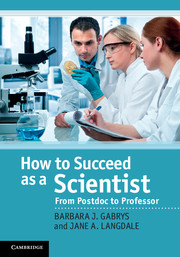21 - Taking on new challenges
from Part III - Managing your career
Published online by Cambridge University Press: 05 November 2011
Summary
Most academics become comfortable with their roles as researchers and teachers in their mid-40s. This still leaves 20 years before retirement, and there are several additional challenges that you can choose to take on at this point in your career. In contrast to earlier career stages, the choices are now mainly personality driven – you really can do what you want to do – as long as you do it well. In this chapter we present the personal stories of four eminent scientists to illustrate how varied your choices are.
The theory
It should be evident from the preceding chapters that a successful career in the sciences is based on several habits as defined by Covey (2004). It is not fashionable to talk about mission and vision, but all successful people have that – it drives their choices, and is supported by doing first things first. Further career enhancement often comes through working synergistically with others. If asked what contributed to their standing in the scientific community, many would say it was luck – they were in the right place at the right time. However, luck is a combination of preparedness and opportunity – if you are not prepared when an opportunity arises, or if you fail to spot an opportunity – you will be unlucky.
We could make a long list of the attributes that successful scientists have. But it seems that there is one characteristic common to many – having established themselves, they feel a bit restless in their mid-40s and look for other outlets for their energy. It is likely that their research is running smoothly, they are accomplished teachers and they can cope with their administrative load. So how can they direct their ‘spare’ time and energy into something different?
Information
- Type
- Chapter
- Information
- How to Succeed as a ScientistFrom Postdoc to Professor, pp. 184 - 201Publisher: Cambridge University PressPrint publication year: 2011
